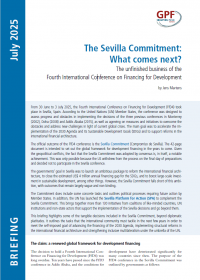Corporate actors – be they companies, their associations, foundations, or employees - play an ever-increasing role in global, international and national policymaking. Corporate investment is regarded as an “innovative” source of finance for international organizations, for public service provision or infrastructure investments. Private actors influence policy making on all levels as well as international discourses around issues like health, human rights, or taxation.
This section explores the trend to “partnerships” – with the private sector or “multistakeholder”, as well as the influence of corporations in various levels of governance. It highlights and analyzes the influence of corporate actors in various policy arenas and highlights the specific role of private philanthropic foundations. Are there potentially negative repercussions for relying too heavily on the private sector? And what are the limits of and alternatives to the trend in establishing more and more so-called “partnerships” between the public and private sectors? One specific focus in our work on corporations is following various processes that are aimed at creating binding norms for transnational corporations, especially in the area of business and human rights. On this issue, we collaborate closely with our partners in the global Treaty Alliance and the Treaty Alliance Deutschland to promote ecologically and socially sustainable supply chains at a global level.
From October 20–24, 2025, 63 states came together at the United Nations (UN) Human Rights Council to negotiate an international, legally binding instrument to regulate the activities of transnational [...]





